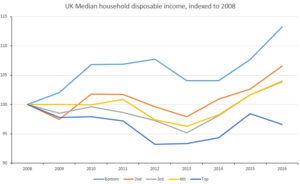
| 2021–present United Kingdom cost-of-living crisis |
|---|
 |
| Background |
| Industrial action |
The United Kingdom government austerity programme was a fiscal policy that was adopted for a period in the early 21st century following the era of the Great Recession. Coalition and Conservative governments in office from 2010 to 2019 used the term, and it was applied again by many observers to describe Conservative Party policies from 2021 to 2024, during the cost of living crisis. With the exception of the short-lived Truss ministry, the governments in power over the second period did not formally re-adopt the term. The two austerity periods are separated by increased spending during the COVID-19 pandemic. The first period was one of the most extensive deficit reduction programmes seen in any advanced economy since the Second World War, with emphasis placed on shrinking the state, rather than consolidating fiscally as was more common elsewhere in Europe.[2]
The Conservative-led government claimed that austerity served as a deficit reduction programme consisting of sustained reductions in public spending and tax rises, intended to reduce the government budget deficit and the role of the welfare state in the United Kingdom. Some commentators accepted this claim, but many scholars observe that its primary, largely unstated aim, like most austerity policies,[3] was to restore the rate of profit.[4][5] Most prominent economists agree that austerity does not work in bringing about a recovery from recession.[3] Successive Conservative governments claimed that the National Health Service[6] and education[7] had ostensibly been "ringfenced" and protected from direct spending cuts,[8] but between 2010 and 2019 more than £30 billion in spending reductions were made to welfare payments, housing subsidies, and social services.[9]
There was no central function or risk assessment made to predict the impact of the austerity programme on services and budgets in the long term. There were however "big strategic moves" to protect groups more likely to vote Conservative, and make cuts elsewhere.[2] This meant that the richest 20% of the population were largely protected, and the 2015 Conservative general election victory is credited to this tactic. During the second austerity period, a wider group than before were affected by the resulting cost-of-living crisis. This was connected to declining support for the Conservatives ahead of the 2024 general election, which resulted in a landslide defeat for the party.[10][11] The Conservatives had planned further measures for after the election, some of which were leaked in advance.[12][13]
The effects proved controversial and the policies received criticism from a variety of politicians, economists, and Anti-austerity movements.[2][14] The British Medical Association nicknamed austerity "COVID's little helper" and connected British excess deaths to the effects of austerity on public services, however no causal link was shown and was assumed based upon life expectancy not rising in the UK at the same rate as other selected countries, excluding the United States which showed equal stagnation in life expectancy.[15]
- ^ "Household disposable income and inequality in the UK: financial year ending 2016". Office for National Statistics. 10 January 2017.
- ^ a b c Knight, Sam (28 March 2024). "What Have Fourteen Years of Conservative Rule Done to Britain?". Institute of Health Equity.
- ^ a b "Austerity is not Working". UCL European Institute. London: University College London. 17 May 2012.
- ^ Etherington, David (2020). Austerity, Welfare and Work: Exploring Politics, Geographies and Inequalities. Bristol: Policy Press. pp. 28–41. ISBN 9781447350088.
- ^ Burke, Michael (13 October 2014). "There is a 'magic money tree' – it's investment". Policy Research in Macroeconomics. London: PRIME.
- ^ "NHS funding protected?". NHS Support Federation. Retrieved 19 May 2017.
- ^ "School spending stays protected from budget cuts". BBC News. 26 June 2013.
- ^ "Should NHS budget be ring-fenced?". BBC News. 1 May 2013. Retrieved 3 September 2016.
- ^ Cite error: The named reference
Muellerwas invoked but never defined (see the help page). - ^ Merrick, Jane (5 July 2024). "Who killed the Tory party?". inews.co.uk.
- ^ Savage, Michael (16 March 2024). "'Negative budgets': cost of living crisis could lose the Tories dozens of seats". The Observer.
- ^ Stacey, Kiran (26 February 2024). "UK public services will buckle under planned spending cuts, economists warn". The Guardian.
- ^ Jayanetti, Chaminda (14 April 2024). "Leak reveals Tory plan to cut cold weather cash for disabled people". The Guardian.
- ^ Krugman, Paul (29 April 2015). "The Austerity Delusion". The Guardian. Retrieved 2 May 2016.
- ^ "Austerity – COVID's little helper". The British Medical Association is the trade union and professional body for doctors in the UK. Retrieved 19 July 2024.